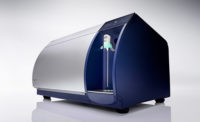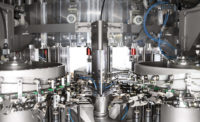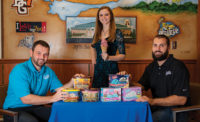Rigid containers get a modern twist
New offerings boost shelf impact, sustainability and convenience

A distinctive shape and 360-degree printable surface maximize the Tetra Evero carton bottle’s shelf impact.

New convenience-minded packs from RPC Bebo UK offer effective portion control and extended ambient shelf life via multilayer versions.

Brown inside and out, Pure-Pak gabletop cartons stand out on store shelves and support the organic positioning of EKO brand products from Arla Foods in Sweden.
Dairies and cheesemakers often choose rigid containers to set products apart from the competition and meet sustainability targets. And new rigid container offerings can help dairy processors enhance shelf impact, sustainability and convenience.
An aseptic first
Aseptic packaging addresses both goals and is gaining popularity with consumers because shelf-stable products require no refrigeration and provide on-the-go convenience, according to “Aseptic Carton Packaging Market — Global Industry Analysis, Size, Share, Growth, Trends and Forecast, 2016-2024,” a 2017 report from Transparency Market Research, Albany, N.Y.
A well-established provider of aseptic products, Gossner Foods, a contract manufacturer in Logan, Utah, operates the first Tetra Pak A6 filling machine in the United States. The machine, from Tetra Pak, Denton, Texas, forms, sterilizes and fills the Tetra Evero container, the world’s first aseptic carton bottle.
A gas-phase sterilization technique, developed for the carton bottle, ensures product safety and shelf stability. The world’s fastest direct-injection molding technology — a first for an aseptic packaging system — creates the bottle-shaped top. In addition, the compact system requires only half the floor space of an aseptic filling line handling polyethylene terephthalate bottles.
“We’re always looking for new ways to bring innovation to our customers, so we knew Tetra Evero would be a great fit,” reported Kelly Luthi, UHT plant manager for Gossner Foods. “We’re looking forward to bringing exciting new products to market in this unique package.”
One of Gossner Foods’ first commercial products in the Tetra Evero carton bottle, Kahlua coffee creamer, takes advantage of the shelf differentiation provided by the iconic shape of the container and its 360-degree printable surface, the company noted. Combining the environmental benefits of a carton with the functionality of a bottle, the carton bottle is lightweight and recyclable. It primarily consists of renewable wood fiber harvested from certified forests. The multilayer packaging material also preserves product quality and nutrition without the need for preservatives or refrigeration.
Aseptic products in Tetra Evero carton bottles can be stored, shipped and merchandised ambiently, expanding options for dairy products.
“Tetra Evero is a great way for brands to reinforce their sustainability commitment while meeting consumers’ nutritional and lifestyle needs,” said Carmen Becker, president and CEO of Tetra Pak U.S. and Canada. “The package has seen great success across Europe, and we’re thrilled we can now offer it to U.S. beverage producers.”
What’s more, Tetra Evero carton bottles are suitable for a wide range of dairy beverages, noted Ulf Attevik, product director for the line, “including white milk, flavored milks, milks enriched with vitamins and minerals, cream and half & half with up to 20% fat content.”
He noted that the carton’s unique top construction allows for very smooth pouring, while two grip options help to ensure mess-free usage.
“The one-step opening with two-step safety is easy to open while delivering safe, quality products,” Attevik added. “As the cap is turned, the inner membrane is cut and collected in the cap. The consumer hears the cap click as the tamper-evident ring is broken.”
Designed to get noticed
Another distinctive aseptic package, the combismile carton for products consumed on-the-go, combines a distinctive smile shape and easy-grip corners with aseptic filling on a CFA 1724 form-fill-seal machine from SIG Combibloc, Inc., Chester, Pa., the U.S. subsidiary of SIG Combibloc Group AG, Neuhausen am Rheinfall, Switzerland. The design accommodates a reclosable single-action spout or two sizes of straw holes.
A strong sustainability message, meanwhile, is delivered by the brown color of unbleached wood fibers used to make Natura Life paperboard from Stora Enso, Helsinki, Finland. The unbleached paperboard not only retains the color of the fibers inside and out, but also displays a visible fiber structure to impart a natural look and feel to Pure-Pak cartons made by Elopak, Buskerud, Norway, for EKO brand organic products from Arla Foods AB, Stockholm, Sweden.
“We believe that the new Pure-Pak carton will grab attention as it communicates organic values and is totally different to anything else in the increasingly complex chilled dairy segment,” stated Anna-Karin Modin Edman, sustainability manager for Arla Foods.
Available in 500-milliliter and 1-liter sizes, the carton runs as a drop-in replacement for traditional gabletop cartons on filling lines for fresh and extended-shelf-life products. Made primarily from fibers sourced from Swedish and Norwegian forests, the cartons are 100% recyclable via existing channels.
And a squeezable, dispensing-friendly bottle sets cream cheese from Basking Ridge, N.J.-based Arla Foods USA apart from that in traditional tubs or foil-wrapped cartoned blocks. Designed for kids, the category-changing 6.2-ounce bottle features an easy-to-hold, waisted shape and rests on a flip-top dispensing closure that enables mess-free application of plain or strawberry cream cheese.
Shelf impact also is the goal behind reusable glass bottles for the first organic chocolate whole milk from Straus Family Creamery, Petaluma, Calif. The 32-ounce containers continue the creamery’s 23-year tradition of filling its organic milk products in glass and provide differentiation from the plastic jugs or paperboard cartons typically found in the dairy case.
Glass not only delivers a premium appearance in keeping with the organic nature of the product, but also keeps milk colder in the refrigerator to maximize shelf life and helps protect product flavor, which is preserved by a high-temperature, short-time pasteurization process, according to the company. Each glass bottle carries a $2 deposit, and stores that sell the milk collect empty containers. The bottles enjoy an 80% return rate and are refilled six to eight times. Bottles that aren’t returned or are no longer refillable are easily recycled.
Eye on convenience
An assortment of new packs from the U.K.’s RPC Bebo, meanwhile, are positioned for convenience. The 60-millimeter-diameter pot is available in 45-milliliter, 60-milliliter and 75-milliliter sizes. The four-compartment Snap tray features a 220-milliliter capacity per cavity; the four compartments separate easily for individual servings or stacking.
Both packs are suitable for anything that’s traditionally packed in a pot or a cup, including dairy products such as yogurt and dips, said Emma Wise, sales and marketing manager for the company.
“The pots can also be produced in multilayer PP/EVOH/PP, so can be sterilized and retorted,” she noted.
The packs offer a number of advantages to dairy processors, including effective portion control and extended ambient shelf life via multilayer versions. Special grades are offered for microwave cooking and reheating, Wise said.
“The availability of high-clarity materials also enhances the products’ on-shelf appeal,” she added.
Looking for a reprint of this article?
From high-res PDFs to custom plaques, order your copy today!






